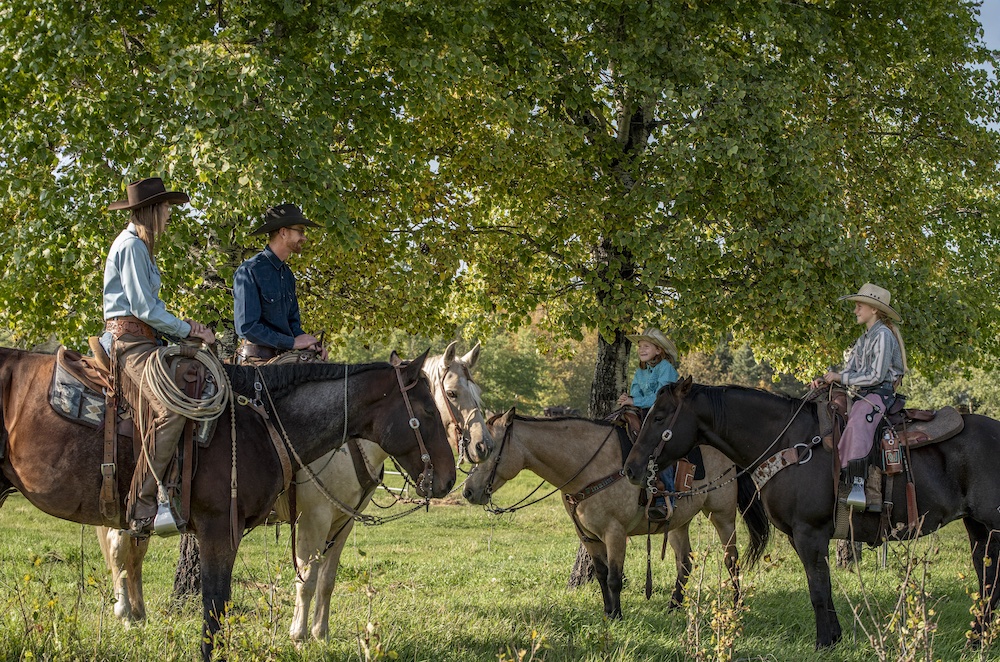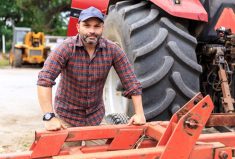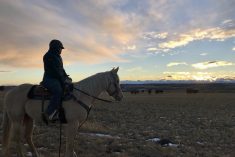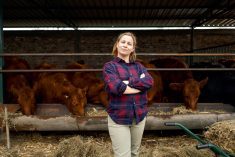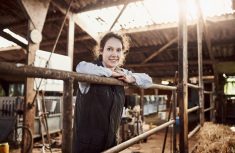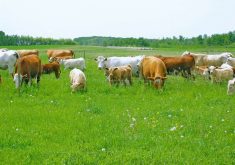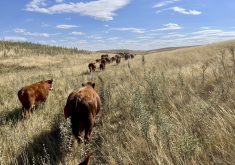Scott and Alicia Adamson found holistic management provided a framework for the succession process
As Scott and Alicia Adamson share their story of ranch succession in northwestern Saskatchewan, the tale begins three generations previously when Scott’s great-grandfather was working on a ranch nearby in the Meadow Lake area in the mid-1940s. Part of Fred Adamson’s pay was in cattle and when his herd size matched that of his employer, he decided to find his own place. He travelled a bit south to Makwa, Sask., sold that year’s calf crop and half the cow herd and bought a ranch.
A few years later Fred and his wife moved to town and two sons, Art (Scott’s grandfather) and Jim, took over the operation. The next generation to be involved were Art’s two sons, Dale (Scott’s father) and Terry. The four Adamsons ran the ranch for many years until 1996, when Art and Jim split the land. Art, Dale and Terry continued with their own place and grew the land base.
Scott grew up always wanting to be a rancher, but his dad’s advice was to have another plan, as it’s tough to make money ranching. Scott worked off the ranch for a few years and then got his electrician’s ticket. Around that time, he was also reacquainted with Alicia, who was working at Lakeland College in Vermilion where he was going to school.
Read Also

Ranch succession part 1: Sibling dynamics and ‘cousin consortiums’
When it comes to passing the ranch down, the biggest obstacle may not lie between parents and children but rather…
Alicia recalls that on their first date, Scott told her, “Just so you know, I am moving to Makwa, Saskatchewan.” The couple moved to the area in 2011 and were married in 2012.

As Scott and Alicia started planning to come back to work on the ranch, Scott’s uncle Terry recommended everyone take a holistic management course together from Don Campbell in 2014. Scott said they did not know a whole lot about it but knew it was more than cows and grass and incorporated a “people” component. All three couples attended together and went through the process of envisioning the quality of life they wanted. They thought about what they needed to produce and create to achieve that quality of life and what the long-term vision was for themselves, their families, their business, their land and their communities.
“Everyone involved has to be willing to start the hard conversation and keep talking. Hiring a facilitator was vital for us. A neutral person that can really bring both generations together and help plan,” said Alicia.
“The (holistic management) framework flipped everything on its head and opened our eyes to the possibilities,” said Scott. One such example was when doing the financial planning and enterprise analysis, the group recognized an opportunity to add a home-raised bull enterprise. Dale and Terry had already been raising a few bulls but were having difficulty finding the bulls they wanted. Coupled with Scott’s keen interest in genetics they felt they could add to their bottom line to support another family.
The planning did not stop there. Scott said they had a lot of encouragement from Terry’s wife, Penny, to keep working on their communication.
“It was tough at the start,” said Scott, “We weren’t used to talking about a lot of that stuff and (we) worked on building trust.”
But they were committed to doing the best job possible and continued to work with Don Campbell on a one-on-one basis. Scott gives Campbell a great deal of credit for helping them work through the process. He recommended that they come up with their own vision before going to the professionals. When they did, they were met with “You don’t want to do that,” from the accountants. But they stuck to the course that worked best for their family.
Specifically, that was taking land out of personal names and moving it to the corporation. Often the advice is to keep it in personal to utilize the capital gains exemption. The Adamsons wanted to ensure that the ranch management and ownership were linked to land access.
In 2018, they froze the assets of the company and Scott and Alicia started the buyout. The senior members switched from voting shares to preferred shares.
When they were first involved with the ranch, Scott and Alicia had some of their own enterprises of horses and stock dogs, but now that they have taken over completely, they have incorporated what works to bring all aspects of their life together.
The couple talks about each generation having different skills and interests. By keeping the core business of the ranch the same, they can add to fulfil the individual’s specific natures.
As often is the case, Alicia, as the daughter-in-law, brings a unique perspective. She stressed the importance of stepping back to get a big-picture view. “It is harder to see, the closer you get,” she said. She added that Dale and Terry were early adopters and open-minded.

Beyond the corporate structure and ownership, the day-to-day operations have shifted to the younger couple, but Scott’s dad and uncle are still involved. Scott acknowledged it is not always easy for the senior generation to “let go.”
“It is interesting, though, because the more they step back, the more I find myself going to them for advice.” He also recognizes that energy levels change, and people cannot always keep up the same pace. Alicia and Scott want to accommodate for the desired level of involvement.
One aspect that is quite different is Alicia’s involvement in managing and working on the ranch as Scott’s partner. With previous generations, the women were supportive and active, but not in actual ranch operations. Alicia is skilled at working with cattle, horses and dogs. She and their two daughters work daily alongside Scott. The couple both credit the holistic management annual financial process for helping them make sure they can meet the commitments of the buyout.
Alicia considers them blessed. “We can be doing what we love and make a living at it in a multi-generational operation. Keep it in perspective — do not make your business into something more than it is. It is a way to make a living, a place to raise your family and a very enjoyable living. But when you die you cannot take it with you. Make your relationships more important than the work that is directly in front of you.”
Alicia also emphasized letting the kids be involved and trusting them to do important things, which the couple does with their two daughters, Lily (age 10) and Ivy (age eight).
The couple consider it a blessing to have three generations working together, and never take that time for granted. Their advice for others? Ask questions of the older generation (not only what they’ve done but also the circumstances at that time). Try to gain insight into why things were done a certain way to make good decisions in the future. Remember that times change, and we must be equipped to make decisions as circumstances change.

